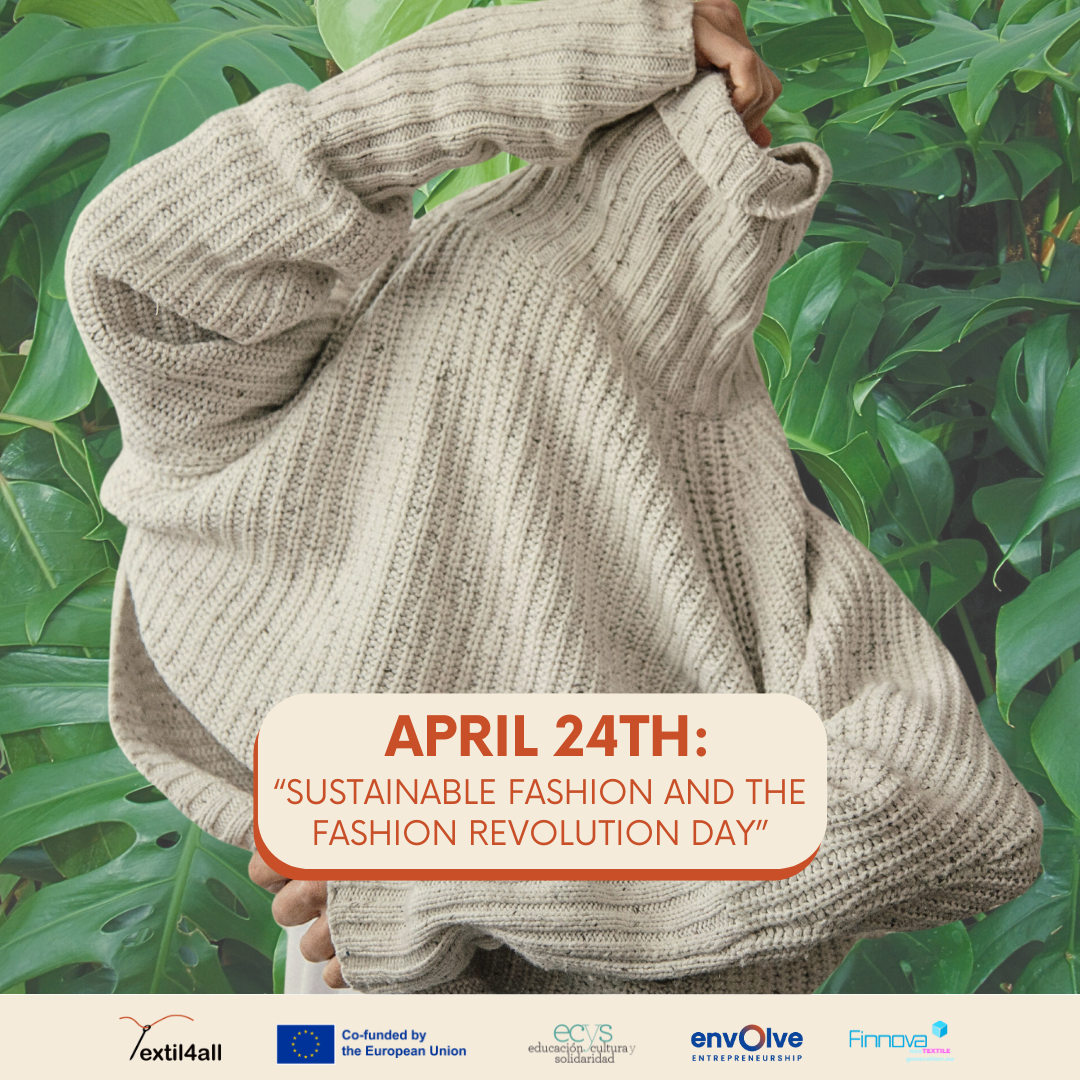- Textile consumption is on the rise, emphasizing the urgent need for sustainable practices.
- The European Commission seeks to redefine the concept of sustainability and ensure that brands demonstrate with facts and details that their garments comply with environmental and human rights requirements
- The project seeks to promote a more sustainable textile industry committed to today´s environmental challenges
Today, 24th April is Sustainable Fashion and Fashion Revolution Day, a date that reminds us of the importance of making sustainable use of clothes, shoes and accessories we wear. From Textil4all we celebrate this date, focusing on the progress towards a more sustainable fashion industry and honoring the Fashion Revolution movement.
The textile sector is the second most polluting industry in the world and the EU has set out to reduce the environmental and climate change impacts of textiles. To do so, it is crucial to shift towards circular business models to save on raw materials, energy, water and land use, emissions and waste.
The European Union (EU) has a clear vision for the year 2030: that all textile garments should be durable and recyclable, made mostly from recycled fibers, free of harmful substances and produced in conditions that respect both social rights and the environment. This ambitious goal is in line with the European Green Pact, where climate neutrality is pursued, reducing the carbon footprint by 55% by 2030 and aiming to achieve net zero emissions by 2050. To achieve this, the European Commission is promoting a series of measures that affect both the way fashion is produced and consumed. All these premises are considered by the European project Textil4all, which seeks to promote a more sustainable textile industry committed to today´s environmental challenges.
Also, the Fashion Revolution is a global movement calling for greater transparency, sustainability, and ethics in the fashion industry. They produce an annual Fashion Transparency Index, which assesses and ranks major fashion brands and retailers on their transparency and sustainability efforts, including those operating in the EU.
Over the years, the lack of transparency in the fashion industry was not under public scrutiny. The supply chain is quite complex and vague, millions of workers are exploited and are working obscene amounts of hours for insufficient wages in inadequate conditions. Main reason why the focus on transparency is a key feature of these new laws.
The European Commission seeks to redefine the concept of sustainability and ensure that brands demonstrate with facts and details that their garments comply with environmental and human rights requirements. This empowers consumers by providing them with full information to make informed and sustainable choices. The Green Claims Directive will ensure that brands do not call themselves sustainable without recognized certifications and life cycle analysis. This will create a more unified and competitive marketplace.
According to recent reports, textile consumption is on the rise, emphasizing the urgent need for sustainable practices. This is why initiatives like ours are crucial in advancing the sustainability agenda within the fashion industry.
Together, let’s revolutionize the fashion industry for a greener, more conscious, and more sustainable future.
Join us in this mission to make the textile sector an engine for positive change!
Textil4all is part of the European Erasmus+ program funded by SEPIE-Spanish Service for the Internationalization of Education with a budget of 60,000 euros and a duration of 19 months. Led by Educación, cultura y solidaridad (Spain), the project counts with Envolve (Greece) and Finnova Foundation (Belgium) as partners.
About Educación Cultura y Solidaridad (ECyS)
Educación Cultura y Solidaridad is a non-profit association whose mission is to promote the integral development of people so that they can be protagonists of their own history and collaborate in the construction of social problems, promoting participation and local development for a fairer world and an inclusive society. To this end, it carries out actions of socio-educational intervention with people and groups with greater difficulty of inclusion, promoting their empowerment. The Centre is consolidated and recognised in San Cristóbal de los Ángeles (Madrid) as a point of reference for families, children and young people from different backgrounds and young people at risk of exclusion, to whom it offers the possibility of socio-professional and academic training.
About ENVOLVE
Envolve is a global organisation that supports entrepreneurship and innovation. Envolve Greece is part of Libra Social Responsibility, with initiatives offering educational and entrepreneurial opportunities, including support for RSL’s activities in response to the refugee crisis. Envolve is a member of the Ecosystex network (part of the European Technology Platform for the Future of Textiles and Clothing) and offers programmes that support entrepreneurship and sustainable enterprises.
About Finnova
The Finnova Foundation is a Spanish-Belgian non-profit organisation created in 2009 with the aim of promoting innovation both regionally and locally across Europe, and internationally through partner countries. Finnova focuses especially on innovation in the fields of new technologies or business models related to environmental sustainability and social inclusion.

